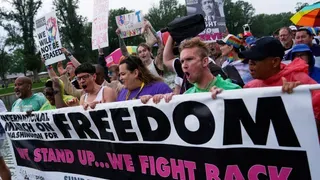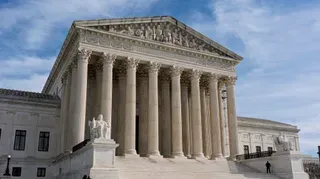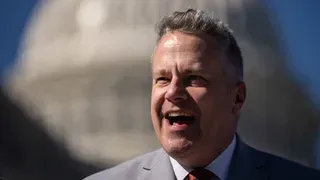October 6, 2008
Gay Senegalese Entertainer Finds Home in U.S.
Kilian Melloy READ TIME: 5 MIN.
A West African man accused in the media of his home country of putting together a same-sex wedding was pursued by mobs, harassed by the Senegalese police, and forced to live as a fugitive in his own land.
Then he was accepted as a gay refugee by the U.S. government--one of a scant few instances in which a gay foreigner has been taken in because he would be in danger if left in his home nation.
The New York Times reported on the story of Pape Mbaye online in an Oct. 5 story, with a print version of the story being published the following day.
The 24-year-old Senegalese native earned his livelihood in Dakar as a singer and dancer, the article said, until the publication, last February, of a story about a purported gay wedding.
The ceremony was said by a Senegalese magazine to have taken place in secret and been planned by Mbaye.
The magazine ran photos of the purported gay marriage, showing Mbaye in attendance.
That plunged Mbaye, who is a gay man, into mortal peril: according to Mbaye, mobs of armed people sought to do him harm, and the police were no help. Quite the opposite: Mbaye says that the police harassed him, too.
Mbaye, whom the Times characterized as "flamboyant" in his manner and dress, made his way to the United States, where, in July, he was granted leave to remain in the country as a refugee.
"I feel good," Mbaye was quoted as saying in the article. "There's security, there's independence, there's peace," in America.
Mbaye has contacts among New York's Senegalese community, which is a mixed blessing. While it means that he has support and assistance, it also means that the anti-gay attitudes of the old country may very well revisit Mbaye in the land of the free.
Mbaye described one confrontation he experienced on the street with a Senegalese immigrant who made what sounded like a threat on his life. Recounted Mbaye, "He said, 'If you were in Senegal, I would kill you.'"
Said Mbaye, "I have my freedom now, and that man wanted to take it."
That freedom may not have been granted to Mbaye had he not been famous in his home country, putting the entertainer into the cross-hairs of virulent anti-gay sentiment.
The Senegalese media went all-out in its scourging of Mbaye, according to the immigration lawyer who represented him.
Said Christopher Nugent of the Washington legal firm Holland & Knight, who does pro bono work for those seeking refugee or asylum status, "He was vilified in the Senegalese media as being the face of the sinful homosexual, and he had scars to show."
There are no official numbers on how many gay refugees and asylum seekers are admitted to the U.S., but anecdotal evidence suggests the number is not large. Nugent was cited in the article as saying he had only heard of a few such cases.
That means that for most gay nationals of other countries, help might not be easily available. Anti-gay speech and legal action have been on the uptick in a number of African countries, for example; the New York Times said that gays and lesbians had been subject to arrest in Cameroon, Ghana, Nigeria, and Uganda, as well as other countries.
The article quoted Joel Nan, a Cameroon native who is now with the International Gay and Lesbian Human Rights Commission.
Said Nan, "In most countries there is poverty and instability, and usually homosexuality is used as a way of shifting the attention from the actual problem to this thing that is not really the problem but can distract the public."
The Times article said that in Senegal, Islamic politicians had contributed to an increasingly anti-gay national mood.
The country has had laws on the books against gays since 1965, but they have not been vigorously enforced, particularly among artists such as Mbaye, who has lived more less openly as a gay man and whose success as a singer, dancer, and storyteller had earned him a place amid the nation's upper class.
But even Mbaye's popularity and success as an entertainer was no protection when the sensationalistic article was published claiming that he had played a central role in the so-called "gay wedding."
Mbaye said that the "wedding" was nothing of the sort, but simply a party. But once the allegations had been made in the press, the specter of homophobia began to haunt Mbaye, who was arrested, together with a small group of friends, the day after the magazine story was published.
The men were detained by police for four days, until international pressure led to their release.
Upon their release, Mbaye and his companions were given advice from the police that was less than reassuring.
As Mbaye had it in an account he furnished to the Human Rights Watch, an official warned that, "The police cannot guarantee your security because the entire society will be out to get you."
While he was in jail, the article said, Mbaye's apartment was ransacked and vandalized, the Times article said; he took shelter in another town with a number of other gay men, but they were attacked by a crowd armed with makeshift weapons such as broken bottles.
That was when Mbaye decided to leave the country, and headed for Gambia--only to leave again within days when the country's president, Yahya Jammeh, said that he intended to lop the heads off all gays.
As soon as Mbaye set foot back in Senegal, the media were on the story, and another crowd pursued him. The singer was taken in by human rights group Raddho, and they put him in touch with Human Rights Watch.
In an interview during this time, Mbaye reckoned, "I am like a hunted animal."
Mbaye made his way to Ghana, with the help of Human Rights Watch, but even there he was targeted by his countrymen: the Times reported that a crowd of Senegalese immigrants living in Ghana came after him, armed with knives.
Mbaye survived the encounter, though he sustained injuries.
The severity, and the high profile, of his situation may have been a factor in the speed and positive outcome that Mbaye's case received, the article said.
For others, who are not as well known or who are not so fortunate in surviving such encounters, help might well come too late--if it comes at all.
Meantime, Mbaye is putting his life together in his new country, looking to forge his career afresh.
The article quoted Mbaye as saying, "I want to live with the gays!"
Added the Senegalese entertainer, "Pape Mbaye is American!"
Kilian Melloy serves as EDGE Media Network's Associate Arts Editor and Staff Contributor. His professional memberships include the National Lesbian & Gay Journalists Association, the Boston Online Film Critics Association, The Gay and Lesbian Entertainment Critics Association, and the Boston Theater Critics Association's Elliot Norton Awards Committee.







